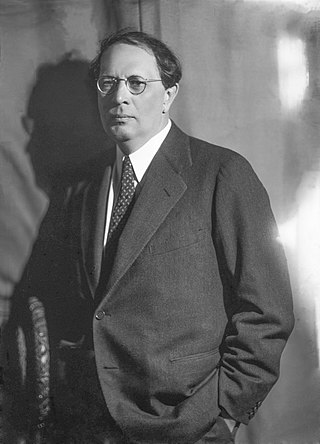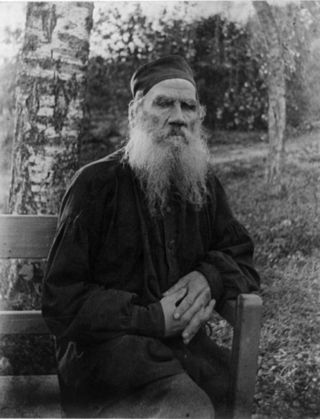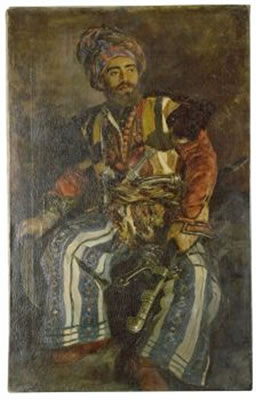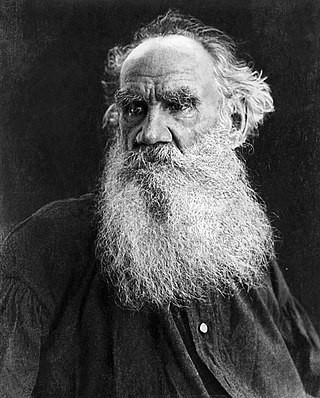Related Research Articles

The House of Tolstoy, or Tolstoi, is a family of Russian gentry that acceded to the high aristocracy of the Russian Empire. The name Tolstoy is itself derived from the Russian adjective "толстый". They are the descendants of Andrey Kharitonovich Tolstoy, who moved from Chernigov to Moscow and served under Vasily II of Moscow in the 15th century. The "wild Tolstoys", as they were known in the high society of Imperial Russia, have left a lasting legacy in Russian politics, military history, literature, and fine arts.
What Is Art? is a book by Leo Tolstoy. It was completed in Russian in 1897 but first published in English due to difficulties with the Russian censors.

Aleksey Nikolayevich Tolstoy was a Russian writer whose works span across many genres, but mainly belonged to science fiction and historical fiction.

"Master and Man" is an 1895 short story by Leo Tolstoy.

The Cossacks is a short novel by Leo Tolstoy, published in 1863 in the popular literary magazine The Russian Messenger. It was originally called Young Manhood. Both Ivan Turgenev and the Nobel prize-winning Russian writer Ivan Bunin gave the work great praise, with Turgenev calling it his favourite work by Tolstoy. Tolstoy began work on the story in August 1853. In August 1857, after having reread the Iliad, he vowed to completely rewrite The Cossacks. In February 1862, after having lost badly at cards he finished the novel to help pay his debts. The novel was published in 1863, the same year his first child was born.

This is a list of works by Russian writer Leo Tolstoy (1828–1910), including his novels, novellas, short stories, fables and parables, plays, and nonfiction.
"The Snowstorm" is a short story by the Russian author Leo Tolstoy. It was first published in 1856, in the literary and political magazine Sovremennik.

"Croesus and Fate" is a short story by Leo Tolstoy that is a retelling of a Greek legend, classically told by Herodotus, and Plutarch, about the king Croesus. It was first published in 1886 by Tolstoy's publishing company The Intermediary. Tolstoy's version is shorter than that by Herodotus, and Tolstoy's characterization of Croesus was designed to parallel the title character in his 1886 novella The Death of Ivan Ilych.
"The Grain" or "A Grain As Big As A Hen's Egg" is an 1886 short story by Leo Tolstoy about a king seeking to understand the properties of a grain he acquires.

Count Lev Nikolayevich Tolstoy, usually referred to in English as Leo Tolstoy, was a Russian writer regarded as one of the greatest and most influential authors of all time. He received nominations for the Nobel Prize in Literature every year from 1902 to 1906 and for the Nobel Peace Prize in 1901, 1902, and 1909.
"Albert" is a short story by Leo Tolstoy. It was originally published in 1858.

Alexander Ivanovich Ertel was a novelist and short story writer from the Russian Empire.

Count Sergei Lvovich Tolstoy was a composer and ethnomusicologist who was among the first Europeans to make an in-depth study of the music of India. He was also an associate of the Sufi mystic, Inayat Khan, and participated in helping the Doukhobors move to Canada.

"The Teacher of Literature" or "The Russian Master" is an 1894 short story by Anton Chekhov.

"In the Cart" is an 1897 short story by Anton Chekhov, also translated as "The Schoolmistress".
"A Landowner's Morning", also translated as "A Morning of a Landed Proprietor" is a short story by Leo Tolstoy written and published in 1856, early in Tolstoy's career. It is a fragment of Tolstoy's unfinished Novel of a Russian Landowner.
"Diary of a Lunatic" is a short story by Leo Tolstoy written in 1884.
"The Young Tsar" ("Нечаянно") is a short story by Leo Tolstoy written in 1894. According to Tolstoy's diary, he recalled having titled it "The Dream of a Young Tsar". The introduction that prefaces the story is by Aylmer Maude.
"The Godson" is a short story by Leo Tolstoy published in 1886. Inessa Medzhibovskaya, professor of English at New School for Social Research, describes the short story as the tale of a godson who is forbidden to open a certain sealed room in his godfather's palace, but then opens it and is banished, leading to his need for redemption.
"Ilyás" is a short story by Leo Tolstoy written in 1885. It is the story of the farmer, Ilyas, who grew up successful but loses his fortune through mistake, in the end only finding peace without having property.
References
- ↑ Robert Ellsberg (2005). The Saints' Guide to Happiness: Practical Lessons in the Life of the Spirit. Doubleday. p. 40. ISBN 9780385515665.
- ↑ Лев Толстой (граф), Ernest Joseph Simmons (1965). Short novels; stories of love, seduction, and peasant life. Vol. 2. Modern Library. p. xv. ISBN 9780394604824.
- ↑ Ernest J. Simmons (1968). "9.Later Short Novels". Introduction To Tolstoy's Writings.
- ↑ Dan Miller, Dave Ramsey (2010). 48 Days to the Work You Love. B&H Publishing Group. p. 9. ISBN 9781433669330.